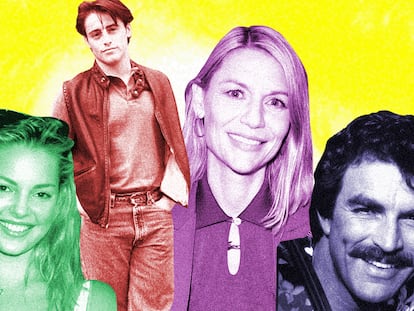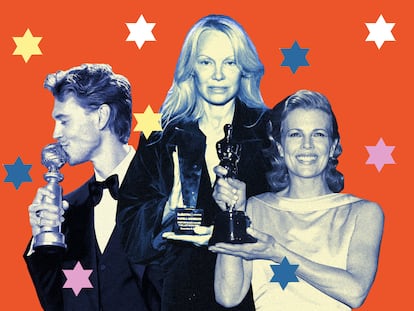‘Acting is the only thing I can do’: The glory, disappearance and comeback of Michael Fassbender
He was declared a big-screen phenomenon before a series of bad artistic decision led to him taking a break — and now he’s back, with ‘The Agency’ and ‘Black Bag’
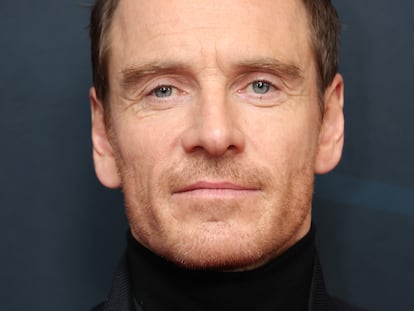

If the Mayans had been right and the world had ended in 2012, the last great Hollywood star would have been Michael Fassbender. In 2011, he was the most in-demand and ubiquitous actor out there. He dominated magazine covers, killed at the box office, and won over critics with an astute combination of indie films and blockbuster franchises. There hadn’t been a performer like Fassbender in Hollywood’s recent memory: not only was he an exquisite actor, he was nonchalantly elegant and attractive. “The new Brando,” they called him. “A modern Errol Flynn,” said David Cronenberg. Director Steve McQueen took his praise even further: “There’s a huge female quality in Michael, of vulnerability, which I think is extraordinary. Michael is an artist. There are actors and there are artists.” The praise was unending.
Over the course of five years, in addition to compliment, he accumulated awards: two Oscar nominations, a Film Critics Award, a Screen Actors Guild Award and the Volpi Cup for Best Actor at the Venice Film Festival. Everyone wanted to link their names to his, and Fassbender began to show up in all the major projects. But in 2017, his star power was snuffed with such virulence that The Guardian asked: “Can Michael Fassbender survive his year of flops?” A series of disastrous releases threatened to “ruin this actor’s previously sparkling career.”
His films had lost their sense of relevancy, when they weren’t out-and-out flops. Although, it wasn’t all bad news. In one of those films that nobody saw, The Light Between Oceans (2016), he met Alicia Vikander, a leading lady who had been on a similar initial trajectory. Vikander had a dazzling rise to becoming the actress of the moment: she won Best Supporting Actress in 2016, and starred in the lucrative franchise Lara Croft. After managing to keep their relationship out of the spotlight, they got married, moved to Lisbon and disappeared as quickly as they had risen to Hollywood’s A-list.
Since then, Fassbender’s name has only appeared in the sports section — he’s been competing as a racecar driver since 2017. Nowadays, when producers ponder actors from Ireland, they’re more likely to think of Paul Mescal.
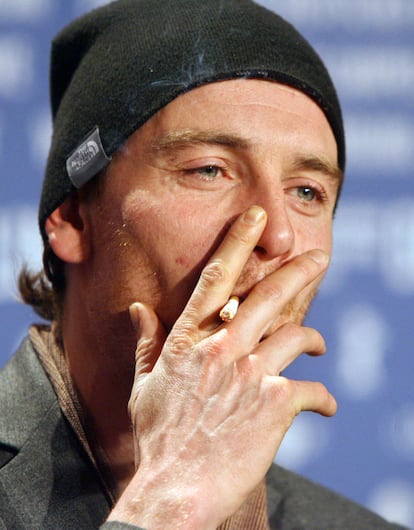
Fassbender made a timid return from his voluntary retirement in 2023 with a couple of projects far beneath the talent he’s shown: a forgettable football movie and The Killer, directed by David Fincher. Now, he’s back with a double comeback, starring in the TV series The Agency and the movie Black Bag, where he’s working under the direction of one of his favorite directors, Steven Soderbergh. The reviews have been mixed, but the actor, focused on his family life, doesn’t seem too eager to return to the forefront.
From heavy metal to performer
Fassbender was born in Heidelberg, Germany to an Irish mother and German father. When the actor was two years old, his family moved to Ireland, where they ran a restaurant. His first passion was for music. In combat shorts, Doc Martens and chest-length hair, he once performed in a heavy metal band.
“We only played one gig,” he told Jimmy Fallon. “It was a little pub, it was lunchtime trade and there was middle-aged people and we were trying to play Metallica and they kept telling us to turn it down.” That group didn’t find much success, and nor did he shine at school. He set out to become a lawyer, architect or journalist, but it didn’t take long for him to shift his focus to acting.
When he was 19, he moved to London to study theater. “It took me a while to come to grips with how expensive London was. My parents helped me out, but we never had a lot of money,” he told The Hollywood Reporter. “So it was very sticky the first three or four years between paying drama school fees and surviving.” The first role he got was on the HBO series Band of Brothers, produced by Steven Spielberg and Tom Hanks.
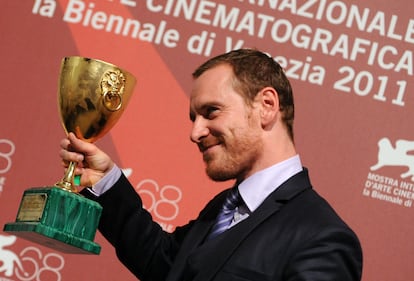
Fassbender thought the series’ critical success would translate into offers for more work. That wasn’t the case. He had moved to Los Angeles, but still wasn’t hearing back after auditions.
“I felt very embarrassed and went back to London. I got British television jobs intermittently between the ages of 23 and 27, but it was very patchy,” he told Backstage magazine. To survive, he shot commercials and did any other job that could help him pay rent, working as a waiter and unloading trucks.
Soon enough, his considerable abdominal muscles had him standing out from the other 299 Trojans in 300 (2007), Zack Snyder’s vigorous adaptation of Frank Miller’s graphic novel, in which Fassbender played the character Stelios. But it was his work with a first-time director that would change his life.
Fassbender’s first encounter with the man who would change his life was disastrous. Director Steve McQueen came from animation and wasn’t used to dealing with actors. Fassbender, on the other hand, had suffered too many disappointments, and his nervousness could come across as arrogance. “When he came in to audition in 2007, I thought, ‘Who is this guy?’ He almost seemed like he couldn’t be bothered,” McQueen told Backstage. “What I didn’t know was all the rejection he had suffered. He was asked back for a second audition, and the lights went on. I jumped on the back of his motorcyle and we got pissed together.”
McQueen was looking for a protagonist for Hunger, the real-life story of Bobby Sands, an IRA prisoner who dies after a prison hunger strike. It seemed like a perfect role for Fassbender, whose family claims to be descended from the revolutionary Irish leader Michael Collins (who is played by Liam Neeson in the film). To be able to represent Sands in the last days of his life, Fassbender spent months eating berries, nuts and sardines, eventually losing 44 pounds.
Tarantino and wrinkles
When the chance arose to work with Quentin Tarantino, nerves once again got the best of Fassbender, leading to yet another disastrous first audition. “I called my parents straight away after I came out and I was like, ‘I blew it,” he told Business Insider.
Luckily, his performance as Hicox was sufficiently convincing to win over the director. The rest is history. Hollywood didn’t know if he was a promising young actor or a veteran who arrived late to stardom.
“I remember when I first went to Los Angeles, I was 24 and they thought I was 35,” he said. “The agent who took me to a television show didn’t believe me and I had to show her my driver’s license to prove I was 24. I quite enjoy the lines on my forehead and the lines on my face, because that’s my life. That’s my history and I like to see it in other people. This wrinkle is down to some girl that broke my heart and I don’t want to escape it in any way.”
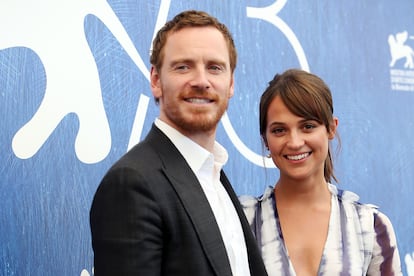
In Chinese astrology, 2011 was a year of the rabbit, but in Hollywood it was the year of Fassbender. He played the romantic Rochester in Jane Eyre and Magneto, one of the most complex characters in the Marvel universe. He was philosopher Carl Jung under the direction of David Cronenberg and Stephen Soderbergh cast him in Haywire. But it was Shame (2011) that allowed him to show his full potential. His brutal and heartbreaking portrayal of a sex addict dazzled critics and full-frontal nudity turned a part of his body seldom seen in the spotlight into the star of awards season.
“Your penis was a revelation. I’m available to work with it anytime,” Charlize Theron declared during a non-profit’s gala. “Really Michael, honestly, you can play golf like this with your hands behind your back,” joked George Clooney in a Golden Globes acceptance speech. Vanity Fair published an article titled “A Year in the Life of Michael Fassbender’s Penis.” Not a newspaper interview went by in which the journalist did not mention his sexual organ. The Oscar nomination that everyone was taking for granted, though, did not materialize. Fassbender thinks that all the commotion over his member was to blame. “That peeing cost me an Oscar,” he told GQ, referring to the scene, in which he goes to the bathroom, naked.
“At first, people told me I was going to go to the Oscars, and it didn’t matter to me. But they repeat it so many times that you begin to believe it and take it for granted. I thought I’d be there. And then I found I wasn’t and I felt bad. Really bad,” he told EL PAÍS in 2013.
Of the nude scenes, he’d later say, “It had to be done. It was an essential part of getting inside the character’s psyche.” In another interview he expressed confusion over the double standard when it came to male nude scenes: “A proportion of us in the human race have penises and another proportion of them have seen them, whether they be mothers, girlfriends or partners or whatever, so I don’t know why it’s so unusual to show that in a movie.” A similar response has sprung up recently around The White Lotus actor Jason Isaacs, whose penis has attracted a storm of comments.
If 2011 marked his meteoric rise, 2012 was the year that Fassbender solidified his place in Hollywood. Ridley Scott cast him in Prometheus, the revival of the iconic Alien franchise, where he portrayed David, an android fascinated by Lawrence of Arabia. His reunion with Steve McQueen in 12 Years a Slave earned him his first Oscar nomination. A second nomination followed in 2015 for his portrayal of Steve Jobs, after Christian Bale dropped out of Danny Boyle’s film at the last minute.
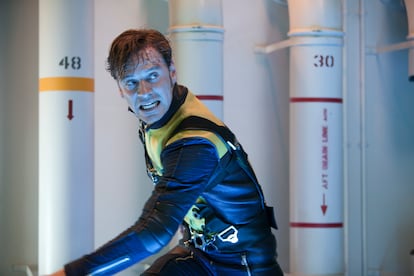
No one worked more and no one appeared on more magazine covers, but fame did not dazzle the actor. “Ten years ago, I would have been attracted and seduced by all of the things that come with fame, but it doesn’t interest me at all anymore,” he told Irish America Magazine in 2012. “I consider myself lucky to have achieved what I have and that a lot of great film makers want to work with me. That’s plenty and more than enough for me to deal with. I spent a lot of time out of work. Now I’m trying to make hay while the sun is shining,”
And then it all went downhill. There came a point when it seemed like nothing Fassbender seemed to work. An adaptation of the video game Assassin’s Creed, for example, was one of the biggest flops of 2016. The reviews were catastrophic, an especially painful blow as the actor had produced the film himself.
Even worse luck befell The Snowman (2017). Based on the successful novel by Jo Nesbø, it possessed all the ingredients to be a box office hit, and yet, it was an unmitigated disaster. With a rating of just 7% on Rotten Tomatoes, it dealt a fatal blow to Fassbender’s career and to Nordic noir.
He vanished from the big screen for six years, except for a brief appearance in Dark Phoenix, one of Marvel’s biggest failures. Despite his private life being tightly guarded, it became known that he had married actress Alicia Vikander. One of Hollywood’s most eligible bachelors, previously linked to Zoe Kravitz, Rosario Dawson, and Lupita Nyong’o, was now off the market.
His downfall coincided with the re-emergence of accusations regarding Fassbender’s past — and his continued silence on the matter. Allegations of domestic violence by the actor’s former partner Sunawin Andrews became public in 2010, just before his Hollywood rise, and before the #MeToo movement. The model and actress filed for a restraining order against the actor and sought $24,000 to pay for medical bills resulting from several injuries she says were caused by Fassbender in fits of rage. Then came the meteoric rise to fame, and there was no trial — only silence.
During his absence from the screen, Fassbender focused on racing, a process documented in Road to Le Mans, as well as on his marriage and fatherhood. Now, after a few tentative returns, he seems to be reigniting his career. ‘I’m glad to be acting again,’ he told IndieWire, downplaying the significance of his hiatus, “because I realize it’s the only thing I can do.”
Sign up for our weekly newsletter to get more English-language news coverage from EL PAÍS USA Edition
Tu suscripción se está usando en otro dispositivo
¿Quieres añadir otro usuario a tu suscripción?
Si continúas leyendo en este dispositivo, no se podrá leer en el otro.
FlechaTu suscripción se está usando en otro dispositivo y solo puedes acceder a EL PAÍS desde un dispositivo a la vez.
Si quieres compartir tu cuenta, cambia tu suscripción a la modalidad Premium, así podrás añadir otro usuario. Cada uno accederá con su propia cuenta de email, lo que os permitirá personalizar vuestra experiencia en EL PAÍS.
¿Tienes una suscripción de empresa? Accede aquí para contratar más cuentas.
En el caso de no saber quién está usando tu cuenta, te recomendamos cambiar tu contraseña aquí.
Si decides continuar compartiendo tu cuenta, este mensaje se mostrará en tu dispositivo y en el de la otra persona que está usando tu cuenta de forma indefinida, afectando a tu experiencia de lectura. Puedes consultar aquí los términos y condiciones de la suscripción digital.
